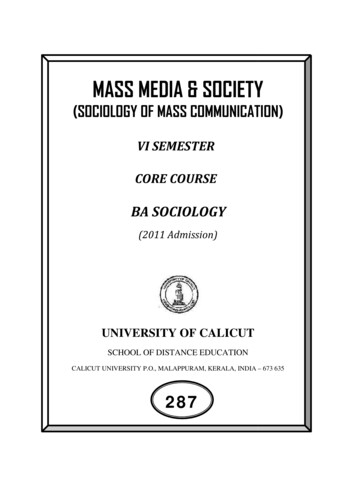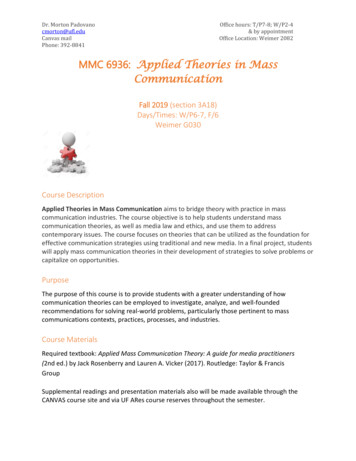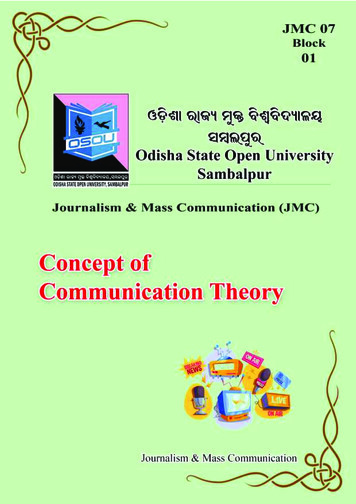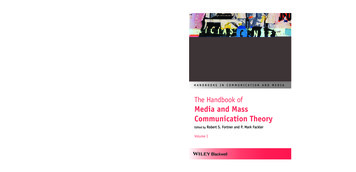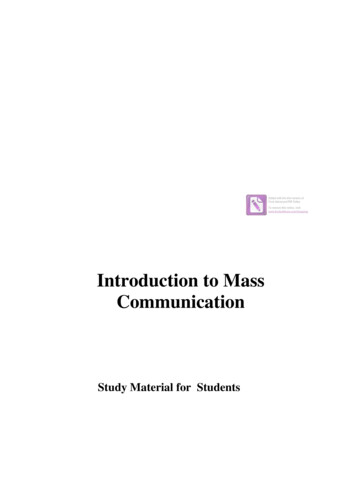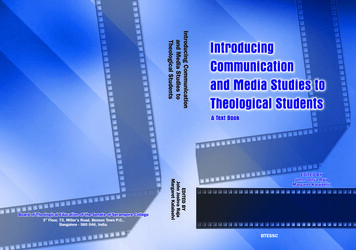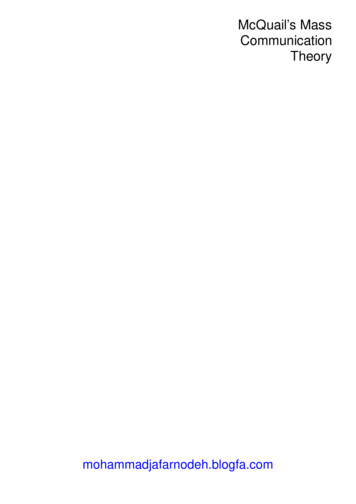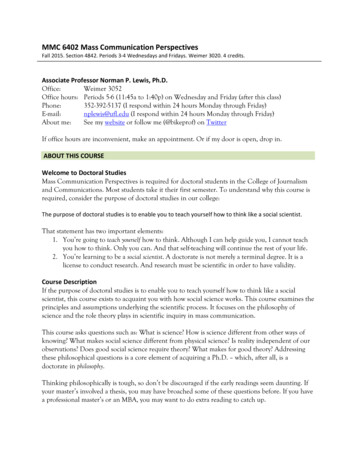
Transcription
MMC 6402 Mass Communication PerspectivesFall 2015. Section 4842. Periods 3-4 Wednesdays and Fridays. Weimer 3020. 4 credits.Associate Professor Norman P. Lewis, Ph.D.Office:Weimer 3052Office hours: Periods 5-6 (11:45a to 1:40p) on Wednesday and Friday (after this class)Phone:352-392-5137 (I respond within 24 hours Monday through Friday)E-mail:nplewis@ufl.edu (I respond within 24 hours Monday through Friday)About me:See my website or follow me (@bikeprof) on TwitterIf office hours are inconvenient, make an appointment. Or if my door is open, drop in.ABOUT THIS COURSEWelcome to Doctoral StudiesMass Communication Perspectives is required for doctoral students in the College of Journalismand Communications. Most students take it their first semester. To understand why this course isrequired, consider the purpose of doctoral studies in our college:The purpose of doctoral studies is to enable you to teach yourself how to think like a social scientist.That statement has two important elements:1. You’re going to teach yourself how to think. Although I can help guide you, I cannot teachyou how to think. Only you can. And that self-teaching will continue the rest of your life.2. You’re learning to be a social scientist. A doctorate is not merely a terminal degree. It is alicense to conduct research. And research must be scientific in order to have validity.Course DescriptionIf the purpose of doctoral studies is to enable you to teach yourself how to think like a socialscientist, this course exists to acquaint you with how social science works. This course examines theprinciples and assumptions underlying the scientific process. It focuses on the philosophy ofscience and the role theory plays in scientific inquiry in mass communication.This course asks questions such as: What is science? How is science different from other ways ofknowing? What makes social science different from physical science? Is reality independent of ourobservations? Does good social science require theory? What makes for good theory? Addressingthese philosophical questions is a core element of acquiring a Ph.D. – which, after all, is adoctorate in philosophy.Thinking philosophically is tough, so don’t be discouraged if the early readings seem daunting. Ifyour master’s involved a thesis, you may have broached some of these questions before. If you havea professional master’s or an MBA, you may want to do extra reading to catch up.
MMC 6402 Perspectives syllabus, fall 2015 / Page 2Course ObjectivesThe course is intended to enable you to:1. Think conceptually as a precursor to conducting scientific research.2. Write cogent papers exploring the philosophy of science and the development of masscommunication theory that can help you prepare for qualifying exams.3. Write a final explication paper worthy of acceptance at an academic conference.4. Evaluate mass communication theory and the role it plays in academic research.5. Become socialized in the world of academic research.Required Textbooks Baran, S.J., & Davis, D.K. (2015). Mass communication theory: Foundations, ferment, and future(7th ed.) Boston. MA: Wadsworth Cengage Learning. ISBN: 978-1-285-05207-6. Godfrey-Smith, P. (2003). Theory and reality: An introduction to the philosophy of science.Chicago, IL: University of Chicago press. ISBN: 0-226-30063-3. Kuhn, Thomas S. (2012). The structure of scientific revolutions, 50th anniversary edition.Chicago, IL: University of Chicago press. ISBN: 978-0-226-45812-0. Shoemaker, P.J.; Tankard, J.W., Jr. & Lasorsa, D.L. (2004). How to build social sciencetheories. Thousand Oaks, CA: Sage Publications. ISBN: 0-7619-2667-4.Also Required: A StylebookPurchase and use either an APA, Chicago, or Bluebook (legal) style manual. If you don’t knowwhich to get, purchase the latest (sixth edition) APA guide (I like the spiral-bound edition) becauseit is the most common style guide in the social sciences. But whatever you choose, buy a copy ineither print or as an e-book. Google is an inadequate substitute for a good style guide.Writing GuideQuality academic journals reject poorly written manuscripts no matter how good the research mayhave been. Therefore, doctoral students must be excellent writers, with a solid command of syntaxand grammar for written English.If your writing skills could stand improvement, both the APA and Chicago style manuals offerhelpful grammar and writing advice. You may also wish to consider buying a writing guide such asStrunk & White’s Elements of style or Diania Hacker’s Writer’s reference. Some students may alsobenefit from hiring a proofreader such as Ronnie Lovler (rlovler@gmail.com).Other ReadingsJournal articles and other assigned readings are available through the course website on theUniversity of Florida e-learning system. These readings are identified with a “PDF” in the classreadings schedule later in this syllabus.
MMC 6402 Perspectives syllabus, fall 2015 / Page 3Statistics ResourcesThis is not a methods or statistics course. However, new doctoral students sometimes wish theyhad a better grounding in the language of research. I recommend these books (listed in order ofusefulness) only if you wish to get a head start on your understanding of quantitative research.None of these books is expected in any way for this class. SPSS survival manual by Julie Pallant (very helpful primer on stats and how to use SPSS) Statistics in plain English by Timothy C. Urdan (rooted in education, easy to follow) What is a p value anyway by Andrew Vickers (biostatistics, but exceptionally cogent) Naked statistics by Charles Wheelan (popular press for a general audience)Keeping Up With ReadingsDoc students learn to acquire information efficiently under an intensive reading load. Some tips: Plan ahead. Budget your time over the semester according to due dates. Find topic sentences and key arguments. Sift what you can skim from what needs more attention. Summarize key points in your own words through brief summaries or simple outlines.Read on Your OwnYou will become a stronger scholar if you immerse yourself in better journals. Some in our fieldinclude (in alphabetical order): Electronic News, Health Communication; International Journal on MediaManagement, Journal of Advertising Research, Journal of Advertising, Journal of Broadcasting & ElectronicMedia, Journal of Communication, Journalism & Mass Communication Quarterly, Journal of Current Issuesand Research in Advertising, Journal of Health Communication, Journal of Public Relations Research, MassCommunication & Society, Public Relations Inquiry, Public Relations Review, and Science Communication.Class ParticipationPart of becoming a scholar is learning how to engage others to challenge assertions. Thus, classparticipation is critical. Don’t let shyness or lack of confidence keep you from contributing todiscussion, for it is when we engage each other that we learn the most. (Also, I call on people atrandom in class to ensure everyone participates.)Class participation depends on each student having read the material ahead of class. Therefore,you are expected to have read (or skimmed, as the schedule denotes) the material for each class.Each student gets one “free pass” from having done the readings for that class to accommodateunexpected circumstances. If you wish to claim that pass, e-mail me ahead of class so I won’t thinkyou’re trying to avoid participating and so I won’t call on you. But do come to class.Attendance is expected unless covered by the UF graduate school attendance policy.Electronic Devices in ClassPlease restrict the use of electronic devices to reading articles or taking (brief) notes. Put away yourcellphone and ignore Facebook while in class.
MMC 6402 Perspectives syllabus, fall 2015 / Page 4Assignment WeightingScience paper . 20%Theory paper . 20%Explication paper introduction . 5%Explication paper . 55%Grading ScaleA100 to 90B 89 to 87B86 to 83B82 to 80Grades are based on results, not effort. Details can be found in rubrics in this syllabus. Consult theUF graduate school catalog for details about the grading policy.Academic IntegrityUF students live by an honor code that prohibits academic dishonesty such as (but not limited to)cheating, plagiarism, fabrication, engaging in unauthorized collaboration, reusing your master’sthesis or a paper from another class, writing a similar paper for two classes, drawing too heavily onanother’s work for your own, and having someone else write your paper.Be aware of the UF graduate school academic honesty policy as well the one in the college’sDoctoral Handbook. Students have an affirmative obligation to know what is in the handbookand to abide by it. The handbook includes a detailed description of plagiarism, copies of which areavailable in Chinese, Korean, Mandarin, Portuguese, and Spanish. If you are unsure of citationrules or what requires attribution, ask me before turning in a paper. Ignorance is not an excuse.My default practice for an academic integrity violation is a failing grade for the course and torecommend removal from the graduate program.Students with DisabilitiesIf you would benefit from disability-related accommodations, contact the Disability ResourceCenter as early in the semester as possible. The center will provide documentation so appropriateaccommodations can be made. The center is in Reid Hall, 392-8565.Help with CopingThe UF Counseling and Wellness Center is a terrific, free resource for any student who could usehelp managing stress or coping with life. The center, at 3190 Radio Road on campus, is open forappointments and emergency walk-ins from 8 a.m. to 5 p.m. Monday through Friday. To make anappointment or receive after-hours assistance, call 352-392-1575.The UF Police can be reached at 392-1111 or, in an emergency, by dialing 911.
MMC 6402 Perspectives syllabus, fall 2015 / Page 5Course EvaluationsStudents are expected to provide feedback on the quality of instruction in this course bycompleting online evaluations. You will be notified by email when the evaluations are open, nearthe end of the semester. Summary results are available to you and the general public.ABOUT THE COURSE PAPERSWhat makes this course 4 credit hours instead of the usual 3 is the range of material and the threerequired papers. Two of those are shorter (8 to 10 pages) papers on assigned topics. The third isthe major paper for the course, an explication paper of 20 to 25 pages of sufficient quality to beaccepted by a regional academic conference. All three are explained below.Why Two Topical Papers?You will write two overview/summation papers, each on a core element of the course: thephilosophy of science and mass communication theory. These papers will help you prepare forpotential qualifying exam questions. Here are some examples of exam questions that drew frommaterial covered in this course:Philosophy of science Although rarely acknowledged, all social science research faces limitations in epistemologyand ontology. Describe those limitations from a philosophical standpoint and howknowing them can inform and improve your dissertation. Drawing from Steven Chaffee’s book on the topic, discuss the process of explicationbeginning with the focal concept, and describe the steps you will need to take to delineateyour study’s epistemological and ontological assumptions.Theory Identify the benefits and limitations of theory in mass communication research in general,and for your dissertation in particular. What does “theory” mean in mass communication scholarship? What criteria determinewhether a mass communication theory is “good”?Thus, one purpose of these two topical papers is that, two years from now, you can pull thesepapers from your files and use them to help you prepare for a related qualifying exam question.More important, these papers are designed to help you think conceptually. Wrestling withdefinitional issues in science and theory help you become a social scientist.About the Two Topical Papers (Science and Theory)1. These are summary papers, not original research studies.2. Each topical paper must be no less than 8 double-spaced pages but should not be muchmore than about 10 pages (excluding endnotes/references).
MMC 6402 Perspectives syllabus, fall 2015 / Page 63. These are not full-blown papers, so no title page or abstract is needed. Neither are sectionheadings.4. These topic papers are overviews about science and theory in the social sciences or masscommunication generally. They are not discipline-specific (advertising, journalism, etc.).5. Most of these papers will summarize what you have learned from the readings and classdiscussion, so you won’t have many sources. Six is sufficient. You may consult othersources beyond those assigned, but you are not required to do so.6. Every academic paper has to advance an argument. Plan to spend your final 2 pagesdetailing the argument you wish to make. This will serve as your conclusion.7. Use primary sources whenever possible. However, secondary sources, such as attributing toGodfrey-Smith a summary of Rene Descartes’s writing, are OK for these topical papers.(But note: Secondary sources are not allowed for the final explication paper.)8. Cite all of your sources, but minimize citing class lectures. Published sources are alwaysbetter than unpublished ones, and published academic sources are best.(For more, see the Technical Details section, the Academic Writing Tips section, and the rubrics.)Topical Paper 1: ScienceThis paper will have a title such as “What Makes the Social Sciences Scientific?” The paper shouldsummarize the key topics covered by the readings and class discussion while sustaining anargument that supports a conclusion.The paper should address seven of these eight issues:1. The ontological, epistemological, and axiological parameters of science.2. How empiricism differs from rationalism.3. How deduction differs from induction.4. How Kuhn and Popper differed in their definitions of science.5. Whether the social sciences can or should imitate the physical sciences.6. How different truth theories help us define what constitutes science.7. Whether reality is independent of observation.8. Structural issues that affect the ability of science to be self-correcting.As you address those issues, you’ll want to focus on a single idea (the title of your paper) so thatyou can seamlessly connect these different concepts with smooth transitions.Deadline: By 9:00 a.m. Tuesday, September 22, upload the science paper to the class website andplace a paper copy in my mailbox.Topical Paper 2: TheoryThis paper will have a title such as “The Evolution of Mass Communication Theories” or “TheOngoing Dichotomy Between Critical and Effects Theories.”
MMC 6402 Perspectives syllabus, fall 2015 / Page 7Generally, the first two pages look like this: A short introductory paragraph of perhaps three sentences gets right to the conclusion ofyour paper. (Unlike the science paper, you won’t have a single idea driving the paper,which means the conclusion otherwise wouldn’t be evident until the end of the paper.) The second paragraph explicates the meaning of the word “theory.” You can discussvarious definitions we’ll explore in class and then conclude with your preferred definition. The third paragraph details what makes good theory. You can draw from a variety ofsources, but synthesize rather than merely summarize. In other words, don’t just list theseven attributes identified by Chaffee and Berger.Next is the core of the paper (about 4 pages). Here you will trace the arc of mass communicationtheory over the four trends defined by Baran & Davis. Because much of the paper will draw fromthat single source, you are likely to have several paragraphs that will have only one citation – forBaran & Davis. (If so, the citation goes at the end of the paragraph.)The core part of the paper should be a synthesis that shows how world events and advancementsin fields such as psychology and sociology shaped the development of mass communication theory.The end is your argument/conclusion (about 2 pages). Some examples: Does the Internet era require new theory? Could mass communication theory exist without sociology and psychology? Have we resolved the debate over whether media are powerful or have limited effects? In our field, has theory driven method or method driven theory?Deadline: By 9:00 a.m. Tuesday, October 20, upload the theory paper to the class website andplace a paper copy in my mailbox.About the Explication PaperBecause this is an advance-level course, the main work product is a paper of sufficient quality to beaccepted at a regional conference such as the AEJMC Midwinter Conference or the SoutheastColloquium. Meeting this requirement is necessary to receive a passing grade for the course.Because the purpose of this class is to improve your conceptualization skills, this is an explicationpaper, not one built on data. In other words, it relies on rationalism rather than empiricism.Because explication papers without data are difficult to get accepted at a conference, the focalpoint of the paper is a model or typology. That model or typology will address or explain a latentproblem, issue or phenomenon involving mass communication.The explication paper must be at least 20 pages and not much more than about 25 pages, doublespaced, not counting the cover page or references. For more details, see the rubric later in thesyllabus.A good example of an explication paper is one that offers a model or a typology:
MMC 6402 Perspectives syllabus, fall 2015 / Page 8 A model uses standard symbols to help explain relationships and causality among concepts.Examples: identify moderators and mediators that influence how commercial weight-lossadvertising is persuasive, show why modalities matter in advertising messages, or explainhow transparency in public relations helps nonprofits.A typology is a parsimonious classification or categorization of a phenomenon. Examples:types of government public diplomacy using public relations theory, types of media literacy,or an examination of who benefits from convergence, all placed along a continuum.We’ll talk more about models and typologies in class, along with examples of such papers (on thecourse website if you want an early look) that have been published in academic journals.Unless an extraordinary circumstance such as a medical emergency arises, deadlines are firm: The first two to three pages (paper copy) are due by 9:00 a.m. Tuesday, Nov. 3. Upload the final, completed paper to the course website by 9:00 a.m. Tuesday, Dec. 15.Begin thinking of topics early. Feel free to consult with your doctoral adviser. You will submit yourproposed introduction (2 to 3 pages) by November 3 so that we can discuss it when we meetindividually for 15 minutes the next day. However, we can always meet sooner if you wish.Explication Paper Proposal Tips1. Begin with a burning question. Think of something important for which you really want toknow the answer – and something that can be answered conceptually.2. As Chaffee wrote in Explication, the purpose of communication science is to reveal thehidden factors that influence what we see. So while observable characteristics such as age orgender may be important, the real power of a study comes in identifying latentcharacteristics such as self-efficacy or para-social interaction.3. Follow the example of the assigned journal articles that presented models or typologieswithout data. Each of the assigned papers identified a problem to be solved. Eachexplained how the model or typology helps solve that problem.4. Therefore, identify the academic problem you wish to solve, or the problem you wish tosolve academically.a. Solve an academic problem, such as the absence of a clear theoretical framework todifferentiate Facebook users.b. Or, solve a problem academically, such as a theory-driven explanation for how someFacebook users confer source credibility to casual connections.c. Don’t try to solve a professional economic problem, such as how TV stations canmonetize its website or a new business model for news.5. The proposal should identify the problem to be solved. It should identify the focal concept(per Chaffee’s Explication). If you’re presenting a model, list the independent anddependent variables. If you have a rough draft – and all you need for the 2- to 3-pageintroduction is a very rough draft -- of your model or typology, offer it in your proposal.
MMC 6402 Perspectives syllabus, fall 2015 / Page 96. The “problem to be solved” approach should guide how you write the proposal and yourpaper. Here’s one formula you can consider:a. In graph 1, identify the focal point. For example: “The roughly 1 billion Facebookusers are not monolithic in their use of the social network but instead seek specificuses that affect how they interact with people offline.”b. In graph 2, identify the problem. For example: “However, the academic literaturedoes not adequate differentiate among Facebook users and thus fails todifferentiate among the likely effects the social network has on interpersonalcommunication.”c. End graph 2 with the purpose statement. For example: “The purpose of this study isto advance a typology of Facebook users along a continuum drawn from sociallearning theory to enable researchers to explore how the social network influencesinterpersonal communication.”7. Non-academic sources are permissible when explicating a current issue such as the use ofbig data in programmatic ad buying. However, published articles from peer-reviewedjournals are best, and the paper requires 25 of them.8. Be specific. Be very specific. Mass communication is inherently complex. As socialscientists, we must break down those complex issues into small, discrete parts so we canisolate variables. Narrow your focal concept. Then narrow it again.Explication Paper StructureA social science research paper involving data typically has five parts:1. Introduction2. Literature review3. Method4. Findings5. Discussion & conclusion (followed by references or endnotes)Because a model or typology has no data to report, the structure will be a little different:1. Cover page with title and the author’s name (1 page).2. Abstract of about 100 words (1 page).3. Introduction (about 3 pages) as follows:a. Identify the problem to be solved academically.b. Have a sentence that begins, “The purpose of this study is to .”c. Specify the paper’s unique contribution to academic knowledge and its “so what.”d. Identify a theoretical base.4. Literature review (about 5 pages) that draws from previous studies to illuminate what isknown about the problem to be solved.
MMC 6402 Perspectives syllabus, fall 2015 / Page 105. Presentation of the model or typology backed by citations to related academic studies(about 10 to 12 pages). If you have a model, include propositions (which are untestedhypotheses) at the end of each variable or construct.6. Discussion/conclusion (about 3 pages) as follows:a. Explain how the model or typology advances academic knowledge.b. Detail (2 to 3 paragraphs) how the model or typology could guide future research.c. Identify the study’s limitations.d. Conclude with a graph with the most persuasive argument for the “so what.”For All Three Papers: Technical Details Purpose: Each paper should have a sentence that begins “The purpose of this(paper/study) is to ” In addition, address the “so what?” question in the introduction andconclusion. Length: Topic papers must be 8 to about 10 pages (not counting a reference list). The finalproject must be 20 to 25 pages (not counting the cover page and the reference section). Sources: Use proper academic sources. Use the databases (Ebsco, etc.) available throughthe library, not solely Google Scholar, which misses a lot of material behind paywalls evenif you’re on the UF network. Also, Wikipedia is not an academic source. Style: Either APA (references) or Chicago (endnotes) or Bluebook (footnotes, for legalpapers) is acceptable. Style is an important element of academic writing. Writing: Clarity is essential in formal academic writing. Be precise in word choice,grammar and spelling. Follow grammar guides and dictionaries. Don’t worry about anoccasional mistake. However, papers with writing that is obtuse, sloppy in the use ofmechanics or hobbled by garbled syntax won’t be accepted for an academic conference –and thus won’t pass muster for this course. Deadlines. Unless an extraordinary circumstance such as a medical or family emergencyarises, deadlines are firm.For All Three Papers: Academic Writing Tips1. Academic work is distinguished by frequent use of citations, the explication of terms andconcepts, and writing that is focused and lucid.a. Cite early and often. Citations document where you got your material and serve asevidence. For your explication paper, more sources a better paper.b. Define terms. Apply Chaffee’s Explication. Vanquish vagueness.c. Write lucidly. Multi-syllabic words swimming in a convoluted syntax is notacademic. Clarity in thought and precision in writing is.d. Prefer citations from research articles published in quality peer-reviewed journals.2. Each paragraph should start with a topic sentence, which describes what the paragraph isabout. In a well-written paper, topic sentences collectively serve as an outline or executivesummary of a paper. Specific topic sentences will help you write more clearly. For example:
MMC 6402 Perspectives syllabus, fall 2015 / Page 11 Too vague: “Two famous writers about the philosophy of science, Karl Popper andThomas Kuhn, offered different views of science and how it is practiced.” True, butthis sentence doesn’t tell the reader how the two differed. Better: “Kuhn described science as a communal practice while Popper saw it as anindividual act, a disagreement that reflects a significant definitional issue in thephilosophy of science.”3. Topic sentences define the parameters of each paragraph. If the paragraph is going toexplore how Kuhn and Popper differed in their definition of science, stick to that topic.Don’t drift into discussions of empiricism vs. rationalism or views of truth in that sameparagraph. Those belong to different paragraphs.4. Therefore, write all the topic sentences for the paper first, and then write the paper. If youdo, your paper will be much better organized and read more fluently.5. Skip the throat-clearing pronouncements such as “this paper will first describe then itwill detail” or “in the next section we’ll explore.” Such pronouncements waste space andare to be avoided except for lengthy papers in legal journals.6. Use past-tense verbs for references of previously published material. A published study doesnot say or writes (present tense). It said or wrote (past tense).7. Use quotes sparingly. Summarize and paraphrase the core idea in your own words.8. Don’t use first-person pronouns such as I, we, or us to refer to yourself. Don’t use thirdperson references such as “the author” or “the researcher.” Instead, structure your writingso that you are never heard from.9. Similarly, don’t use “I believe” or “I think” statements, which weaken your argument. Thestatement is what matters, not who said it.10. Because what matters most in lit reviews is what is said, rather than who said it, mostreferences to authors should be reserved for citations. Weak: As Godfrey-Smith (2003) wrote, induction is inherently flawed. Strong: Induction is inherently flawed (Godfrey-Smith, 2003).11. Support conclusions with evidence. A paper cannot conclude that “social scientistsshouldn’t feel inferior to physical scientists” without first describing why inferiority existsand offering evidence for why the social sciences are equally valid. Unsupported assertionsare not conclusions.12. Use active voice to identify actors. Writing that “it is believed that science involves math”hides from the reader the key issue of who believes that statement.13. Use your stylebook (APA, Chicago, or Bluebook) for stylistic issues such as whether to referto concepts with quotation marks, capital letters, or italics.14. Adhering to American English grammar rules improves comprehension while using sloppygrammar impedes readability. You don’t have to know the difference between a transitiveand intransitive verb to avoid sentence fragments, match singular nouns with singularpronouns, and use plural possessives properly. (Hint: “media” is a plural noun and thusrequires a plural verb.)
MMC 6402 Perspectives syllabus, fall 2015 / Page 12SchedulePart 1: Science paperWed Aug. 261 The Philosophy of ScienceFriAug. 282 Key Issues in Defining ScienceWed Sept. 23 Why Popper and Kuhn MatterFri4 What Makes the Social Sciences Different?Sept. 4Wed Sept. 95 Does Science Math?Fri6 Reality and TruthSept. 11Wed Sept. 167 Is Science Self-Correcting?Fri8 ReviewSept. 18Paper due 9:00 am Tue, Sept. 22Part 2: Theory paperWed Sept. 23FriSept. 259 Does Theory Matter?10 What Makes Good Theory?Wed Sept. 3011 Theory Trend 1: Mass SocietyFri12 Theory Trend 2: Media EffectsOct. 2Wed Oct. 713 Theory Trend 3: Cultural/CriticalFri14 Theory Trend 4: Meaning-MakingOct. 9Wed Oct. 1415 Do New Media Require New Theory?Fri16 ReviewOct. 16Paper due 9:00 am Tue, Oct. 20Part 3: Explication paperWed Oct. 2117ExplicationFriOct. 2318Building TheoryWed Oct. 2819ModelsFri20TypologiesOct. 30Wed Nov. 4Individual meetings in lieu of classFriNo class; homecomingNov. 6Wed Nov. 11No class; Veterans DayFri(no class; work on presentation)Nov. 13Wed Nov. 1821Explication paper presentations 1Fri22Explication paper presentations 2Nov. 20Wed Nov. 25No class; ThanksgivingFriNo class; ThanksgivingNov. 27Wed Dec. 2(no class; work on paper)FriDec. 4(no class; work on paper)Wed Dec. 9(no class; wo
MMC 6402 Mass Communication Perspectives . Fall 2015. Section 4842. Periods 3-4 Wednesdays and Fridays. Weimer 3020. 4 credits. . The purpose of doctoral studies is to enable you to teach yourself how to think like a social scientist. . participation is critical. Don't let shyness or lack of confidence keep you from contributing to
